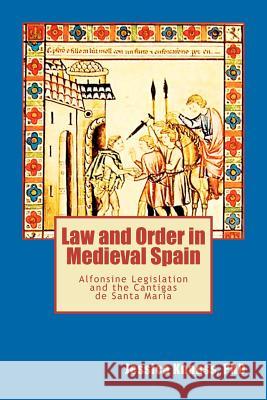Law and Order in Medieval Spain: Alfonsine Legislation and the Cantigas de Santa Maria » książka
Law and Order in Medieval Spain: Alfonsine Legislation and the Cantigas de Santa Maria
ISBN-13: 9781467937177 / Angielski / Miękka / 2011 / 218 str.
Although their milieu bore striking similarities to the Wild West, the people of medieval Spain were preoccupied with constructing valid laws and learning how best to abide by them. This obsession with legality comes out in epics, songs, stories, and even in miracles of the Virgin Mary. Scholars have largely failed to see the usefulness of considering the different types of text produced under Alfonso X together, preferring to look at them in isolation or in conjunction with later literature. By investigating what the varied projects of Alfonso X's scriptorium have in common, as well as how they diverge, we can better approach the underlying ideals manifested in each text. The thirteenth-century society they portray then comes into brilliant focus. This book proposes a new direction for all such studies by suggesting unprecedented comparison between the Cantigas and the other texts from Alfonso X's scriptorium. The legislative program, which presents the guidelines for daily life, manifests the king's theoretical model for an ideal society. In the Cantigas de Santa Maria, time and again, these same ideals are dramatized for the edification of their public. In these songs, Alfonso allows Mary to work for him, promoting his political program for Castile. Specifically, the legal material not only supports Cantigas analyses, but also provides a theoretical context against which the miracle stories play out. Comparing the outcomes with the legal ideal gives a more realistic and comprehensive picture of every day life all over Alfonso X's Iberia. Both texts fulfill a didactic function that unifies the king's disparate works and forms the foundation of Castilian culture.
Zawartość książki może nie spełniać oczekiwań – reklamacje nie obejmują treści, która mogła nie być redakcyjnie ani merytorycznie opracowana.











